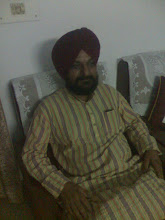Rajesh: http://kriticulture.blogspot.com/
We have been witness to universities mindlessly renouncing their true vocation, the pursuit of critical thinking, and reinventing themselves instead as factories of 'human resources' for an economy hurtling from crisis to crisis. More recently, projects have been undertaken to 'conserve' the Punjabi cultural heritage by video-recording the folk dances and songs (it is another matter if the dancers and singers happen to be university students). Do not such attempts to 'conserve' culture constitute a disavowal of the imperative to think culture in these difficult times? Moreover, by taking recourse to such conservation projects, do we not confine culture to enclaves? If we believe we can 'save' our culture by consigning it to the magnetic/laser tracks on discs, we are being cowardly and dishonest in the face of the challenge to think. Loads of disks may bury our guilt but cannot deliver us from it.
Sukhdev: http://languagecultureideology.blogspot.com/
The projects to video-record folk dances & songs may be attempts to document not to conserve the Punjabi Cultural Heritage.Secondly, folk dances and songs are part of intangible cultural heritage and the intangible heritage of a community is likely to change faster, more so if the given community is at the receiving end in the situation of a close cultural contact (read conflict). Every community (social group) lives within a cultural stream; it is often a smooth renewal of the past showing familiar texture. But the modes, methods & perspectives of development in the recent past have been such that the cultural diversity is threatened. In the age when we are talking, walking, and living globalization & consumerism, the cultural fabric, both tangible and intangible (buildings, sites, languages, robes, food, and everything), is changing very fast. So we as a community are in a flux. However it doesn't mean, we have no culture and we are not 'thinking culture'. What is happening is we are moving away from our cultural heritage but we are not living without a culture.
We may call it a cultural shift. The pressures of emerging life styles as a result of the operative methods & strategies of development moving us into the cultural shift and much of it is happening without any consent of the individual members of the community. That is the existential crisis of 'to be or not to be'; the crisis is not of those only who are on the margin but those also who are at the centre. Yes, the difference is there i.e. some are getting returns while facing the crisis but others are only facing the crisis.Whatever the differences, it is the similarity that has created the 'imperative to think culture'. Now the culture in which we are living, an imperative of our socio-economic development models, 'thinks' even the conservation of cultural heritage as a commodity or an avenue for employment. And as we live in a culture we have to follow its dynamism and paradigms of doing things. To preserve or conserve our cultural heritage is a way of relating, contextualising, not living it. We can conserve the tangible heritage but we can only document or archive our intangible heritage.But the documentation must be authentic.
Friday, January 1, 2010
Subscribe to:
Comments (Atom)




